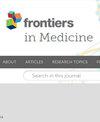Comparative bibliometric analysis of artificial intelligence-assisted polyp diagnosis and AI-assisted digestive endoscopy: trends and growth in AI gastroenterology (2003–2023)
IF 3.1
3区 医学
Q1 MEDICINE, GENERAL & INTERNAL
引用次数: 0
Abstract
IntroductionArtificial intelligence is already widely utilized in gastroenterology. This study aims to comprehensively evaluate the research hotspots and development trends within the field of AI in gastroenterology by employing bibliometric techniques to scrutinize geographical distribution, authorship, affiliated institutions, keyword usage, references, and other pertinent data contained within relevant publications.MethodsThis investigation compiled all pertinent publications related to artificial intelligence in the context of gastrointestinal polyps and digestive endoscopy from 2003 to 2023 within the Web of Science Core Collection database. Furthermore, the study harnessed the tools CiteSpace, VOSviewer, GraphPad Prism and Scimago Graphica for visual data analysis. The study retrieved a total of 2,394 documents in the field of AI in digestive endoscopy and 628 documents specifically related to AI in digestive tract polyps.ResultsThe United States and China are the primary contributors to research in both fields. Since 2019, studies on AI for digestive tract polyps have constituted approximately 25% of the total AI digestive endoscopy studies annually. Six of the top 10 most-cited studies in AI digestive endoscopy also rank among the top 10 most-cited studies in AI for gastrointestinal polyps. Additionally, the number of studies on AI-assisted polyp segmentation is growing the fastest, with significant increases in AI-assisted polyp diagnosis and real-time systems beginning after 2020.DiscussionThe application of AI in gastroenterology has garnered increasing attention. As theoretical advancements in AI for gastroenterology have progressed, real-time diagnosis and detection of gastrointestinal diseases have become feasible in recent years, highlighting the promising potential of AI in this field.人工智能辅助息肉诊断与人工智能辅助消化内镜检查的文献计量对比分析:人工智能消化内镜的发展趋势与增长(2003-2023 年)
引言 人工智能已在消化内科得到广泛应用。本研究旨在通过采用文献计量学技术,仔细研究相关出版物中的地理分布、作者、附属机构、关键词使用、参考文献和其他相关数据,全面评估人工智能在消化内科领域的研究热点和发展趋势。此外,研究还利用 CiteSpace、VOSviewer、GraphPad Prism 和 Scimago Graphica 等工具进行可视化数据分析。研究共检索到2,394篇消化内镜人工智能领域的文献,以及628篇专门与消化道息肉人工智能相关的文献。自2019年以来,有关消化道息肉人工智能的研究约占每年人工智能消化内镜研究总数的25%。在人工智能消化道内窥镜领域被引用次数最多的前 10 项研究中,有 6 项也跻身人工智能消化道息肉领域被引用次数最多的前 10 项研究之列。此外,人工智能辅助息肉分割的研究数量增长最快,2020 年后,人工智能辅助息肉诊断和实时系统的研究将显著增加。随着人工智能在消化内科领域的理论进展,近年来消化道疾病的实时诊断和检测已变得可行,凸显了人工智能在该领域的巨大潜力。
本文章由计算机程序翻译,如有差异,请以英文原文为准。
求助全文
约1分钟内获得全文
求助全文
来源期刊

Frontiers in Medicine
Medicine-General Medicine
CiteScore
5.10
自引率
5.10%
发文量
3710
审稿时长
12 weeks
期刊介绍:
Frontiers in Medicine publishes rigorously peer-reviewed research linking basic research to clinical practice and patient care, as well as translating scientific advances into new therapies and diagnostic tools. Led by an outstanding Editorial Board of international experts, this multidisciplinary open-access journal is at the forefront of disseminating and communicating scientific knowledge and impactful discoveries to researchers, academics, clinicians and the public worldwide.
In addition to papers that provide a link between basic research and clinical practice, a particular emphasis is given to studies that are directly relevant to patient care. In this spirit, the journal publishes the latest research results and medical knowledge that facilitate the translation of scientific advances into new therapies or diagnostic tools. The full listing of the Specialty Sections represented by Frontiers in Medicine is as listed below. As well as the established medical disciplines, Frontiers in Medicine is launching new sections that together will facilitate
- the use of patient-reported outcomes under real world conditions
- the exploitation of big data and the use of novel information and communication tools in the assessment of new medicines
- the scientific bases for guidelines and decisions from regulatory authorities
- access to medicinal products and medical devices worldwide
- addressing the grand health challenges around the world
 求助内容:
求助内容: 应助结果提醒方式:
应助结果提醒方式:


